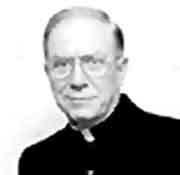 | Father Richard James Cleary was born and reared in Wichita. After graduation from Cathedral High School in 1947, he attended the seminary operated by the Benedictine monks of Conception Abbey in Northwestern Missouri. There he came to appreciate the life of the monks and, having obtained the permission of Bishop Mark Carroll of Wichita, he became a monk of that monastery. After being ordained a priest in 1955, his superiors sent him to get his master’s degree at the University of Ottawa, Canada, then to study in Athens, Greece, and then in Rome, Italy, where he obtained his doctor’s degree in Theology. Finally, he spent a year of study at Harvard University. Later, Fr. Cleary was assigned to teach for many years in Rome. In 1998, he returned to Wichita, where he served in parish ministry at St. Mary’s Cathedral and at Blessed Sacrament parishes. In 2001, his abbot (superior) transferred him to Arkansas, where he served as chaplain of the Benedictine Sisters of Holy Angels Convent in Jonesboro, and helped in the parishes of northeast Arkansas. In March 2010, he was re-assigned to his monastery, Conception Abbey, Conception, in Missouri 64433. He can be contacted there at, 660-944-2877, or by email: rjcleary@juno.com. |
Religion
2003-11-01 15:24:00
Do troubles in the Middle East mean the end of the world is near?
: With all the troubles in the Middle East, I am wondering why it is that such a small region is always the top story, and how far back in history does this conflict go? Is this just coincidence, or is it because the conflict signals the end of the world?
ANSWER: First of all, Jesus tells us that no one knows when will happen the end of the world ( Matt 24:36 and Mark 13:32). There are always plenty of signs to remind us that the end of the world is coming: “but no one knows when that day and hour will come – neither the angels in heaven nor the Son. The Father alone knows.” As far as each one of us is concerned, the end of the world occurs at the moment of our death, when we will be judged. But also the whole fabric of this universe will be concluded at some time in the future, when the dead will arise and Jesus will return in glory for the final judgment. The signs, mentioned in the gospels, are intended as constant reminders that everything in this world is temporary, and we ought to prepare for death and a happy eternity with God and his saints. Every conflict is in someway a signal about the end of the world! Jesus warns repeatedly: “Be prepared!” Now I reflect on that particular piece of geography called the Middle East. The books of the Bible talk mainly about that part of the world, which was familiar to the human writers of the Bible. In the Book of Tobit (chapter 1, verse 4) we read: “When I was young I lived in northern Israel. All the tribes in Israel were supposed to offer sacrifices in Jerusalem. It was the one city that God had chosen from among all the cities, as the place where his temple was to be built for his holy and eternal home.” Why God chose Jerusalem and the Holy Land and the Jewish people as his special people: is a mystery known only to God. But there are other mysteries also, which we have to accept on faith. Our Judeo-Christian faith is based on the books of the Bible. And faith is something we cannot fully understand. If we could understand a matter of faith, then it is no longer a matter of faith: it becomes a scientific fact. In his epistle to the Romans (chapters 9 thru 11) St. Paul discusses this mystery of God’s choice of peoples (and their land). It is a beautiful treatise about God’s free choice, but really doesn’t enlighten us as to the WHY of God’s choice, except that God was well-pleased with a person named Abraham, who was living at Ur in Mesopotamia (modern-day Iraq). Abraham lived about 1800 years before Jesus, and is the patriarch-progenitor of both the Jewish and the Arab peoples. Abraham is also the spiritual father of all Christians. The reason given for God’s pleasure is that, of all people then living on earth, only Abraham believed in and trusted the true God. Recorded history commences in the first book of the Bible (chapter twelve), with God calling Abraham to move a thousand miles west, to the land of Canaan, which we call the “Holy Land.” As the late prime-minister of Israel, Golda Meir, remarked: “How strange of God to choose this land, the only land in the whole Middle East under which there is no natural deposit of oil." Others have remarked: “How odd of God: to choose the Jews!” But he did. The Bible narrates also some of the many conflicts happening in the Middle East before and during and after the time of Abraham. Of the children of the first parents, Cain murdered his innocent brother Abel. Of the children of Abraham and his wife Sara, already in the womb there is rivalry between the twin brothers Esau and Jacob. Esau became the father of the Arab peoples and Jacob became the father of the Jewish people. That rivalry developed into conflicts, which endure to the present day, and underlies some of the troubles in the Middle East. Those conflicts are typical for the rest of the human race.


